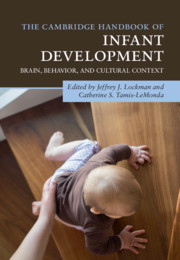Description
The Cambridge Handbook of Infant Development
Brain, Behavior, and Cultural Context
Cambridge Handbooks in Psychology Series
Coordinators: Lockman Jeffrey J., Tamis-LeMonda Catherine S.
This handbook presents an integrative understanding of infant development, across neuroscience, context, and policy from leading experts.
Language: English
Subject for The Cambridge Handbook of Infant Development:
The Cambridge Handbook of Infant Development
Publication date: 08-2020
866 p. · 17.5x25.2 cm · Hardback
Publication date: 08-2020
866 p. · 17.5x25.2 cm · Hardback
The Cambridge Handbook of Infant Development
Publication date: 08-2020
866 p. · 16.9x24.3 cm · Paperback
Publication date: 08-2020
866 p. · 16.9x24.3 cm · Paperback
Description
/li>Contents
/li>Biography
/li>
This multidisciplinary volume features many of the world's leading experts of infant development, who synthesize their research on infant learning and behaviour, while integrating perspectives across neuroscience, socio-cultural context, and policy. It offers an unparalleled overview of infant development across foundational areas such as prenatal development, brain development, epigenetics, physical growth, nutrition, cognition, language, attachment, and risk. The chapters present theoretical and empirical depth and rigor across specific domains of development, while highlighting reciprocal connections among brain, behavior, and social-cultural context. The handbook simultaneously educates, enriches, and encourages. It educates through detailed reviews of innovative methods and empirical foundations and enriches by considering the contexts of brain, culture, and policy. This cutting-edge volume establishes an agenda for future research and policy, and highlights research findings and application for advanced students, researchers, practitioners, and policy-makers with interests in understanding and promoting infant development.
Preface; Part I. Foundations: 1. Embodied Brain Model for Understanding Functional Neural Development of Foetuses and Infants – NOT YET FINAL Yasunori Yamada, Hoshinori Kanazawa, and Yasuo Kuniyoshi; 2. Infant Physical Growth Michelle Lampl; 3. Dynamic Epigenetic Impact of the Environment on the Developing Brain Frances A. Champagne; 4. Brain Development in Infants: Structure and Experience John E. Richards and Stefania Conte; 5. Development during Infancy in Children Later Diagnosed with Autism Spectrum Disorder Terje Falck-Ytter and Emily Jones; Part II. Perceptual Development: 6. Visual Development Daphne Maurer; 7. Infant Visual Attention Dima Amso and Kristen Tummeltshammer; 8. Infants' Perception of Auditory Patterns Laura K. Cirelli and Sandra E. Trehub; 9. The Development of Touch Perception and Body Representation Andrew J. Bremner; 10. Development of Infant Feeding Julie A. Mennella, Catherine A. Forestell, Alison K. Ventura, and Jennifer Orlet Fisher; 11. The Development of Multisensory Attention Skills: Individual Differences, Developmental Outcomes, and Applications Lorraine E. Bahrick, Robert Lickliter, and James T. Todd; Part III. Cognitive Development: 12. Infant Memory Harlene Hayne and Jane S. Herbert; 13. Infant Physical Knowledge Susan J. Hespos and Erin M. Anderson; 14. Infant Categorization Lisa M. Oakes; 15. Early Knowledge about Space and Quantity Nora S. Newcombe; 16. Infant Learning in the Digital Age Sylvia N. Rusnak and Rachel Barr; Part IV. Action: 17. Action in Development: Plasticity, Variability, and Flexibility Jaya Rachwani, Justine Hoch, and Karen E. Adolp; 18. The Mirror Neuron System and Social Cognition Nathan A. Fox, Virginia C. Salo, Ranjan Debnath, Santiago Morales, and Elizabeth G. Smith; 19. Infant Object Manipulation and Play Catherine S. Tamis-LeMonda and Jeffrey J. Lockman; 20. The Infant's Visual World: The Everyday Statistics for Visual Learning Swapnaa Jayaraman and Linda B. Smith; Part V. Language: 21. Infant Speech Perception Rebecca K. Reh and Janet F. Werker; 22. Infant Vocal Learning and Speech Production Anne S. Warlaumont; 23. Infant Word Learning and Emerging Syntax Dani Levine, Kathy Hirsh-Pasek, and Roberta Michnick Golinkoff; 24. Dual Language Exposure and Early Learning Natalie H. Brito; Part VI. Emotional and Social Development: 25. Infant Attachment (to Mother and Father) and its Place in Human Development: Five Decades of Promising Research (and an Unsettled Issue) Or Dagan and Abraham Sagi-Schwartz; 26. Infant Emotion Development and Temperament Evin Aktar and Koraly Pérez-Edgar; 27. Infant Emotional Development Samantha Mitsven, Daniel S. Messinger, Jacquelyn Moffitt, and Yeojin Amy Ahn; 28. Understanding and Evaluating the Moral World in Infancy J. Kiley Hamlin and Miranda Sitch; 29. Cross-Cultural Perspectives on Parent-Infant Interactions Marc H. Bornstein and Gianluca Esposito; Index.
Jeffrey J. Lockman is the Lila L. and Douglas J. Hertz Chair of Psychology at Tulane University, USA, and past-editor of the journal: Child Development.
Catherine S. Tamis-LeMonda is Professor of Applied Psychology at New York University, USA.
Catherine S. Tamis-LeMonda is Professor of Applied Psychology at New York University, USA.
© 2024 LAVOISIER S.A.S.




